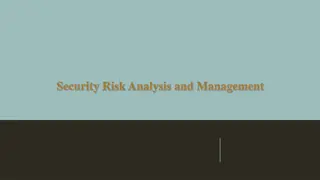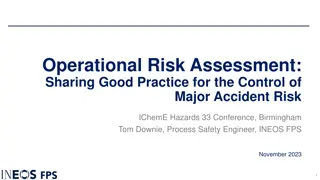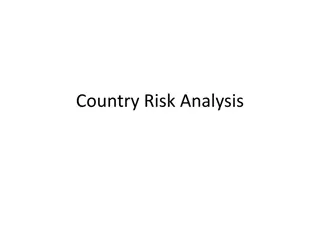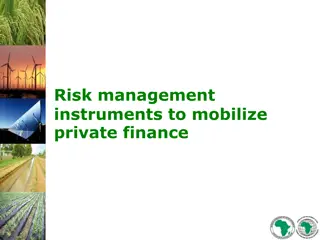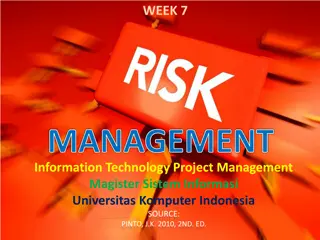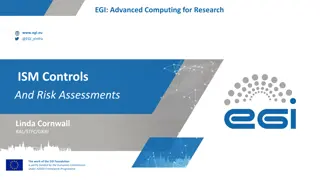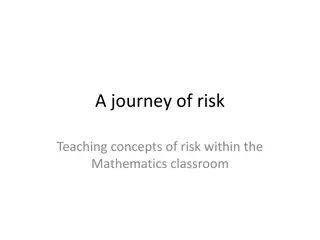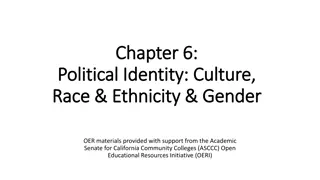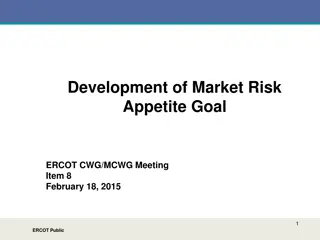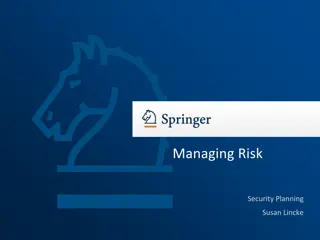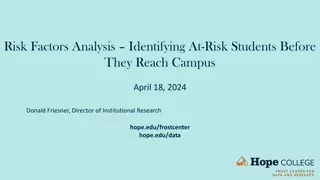Comprehensive Overview of Security Risk Analysis and Management
Explore the essential aspects of security risk analysis and management, including risk identification, assessment, and control techniques within an Information Security (InfoSec) context. Learn about the purpose of risk management, steps involved in a risk management plan, asset identification and c
0 views • 22 slides
Understanding Risk Management in Environmental Geography and Disaster Management
Risk management in environmental geography and disaster management involves assessing the potential losses from hazards, evaluating vulnerability and exposure, and implementing strategies to mitigate risks. It includes calculating risk, dealing with risk through acceptance, avoidance, reduction, or
1 views • 10 slides
Introduction to Flood Risk Assessment with HEC-FDA Overview
This presentation delves into flood risk assessment using HEC-FDA software, covering topics such as defining flood risk, components of uncertainty, consequences of flood risk, and methods to assess flood risk including hydrology, hydraulics, geotechnical, and economics. It explores the intersection
6 views • 39 slides
Operational Risk Assessment for Major Accident Control: Insights from IChemE Hazards 33 Conference
This content provides valuable insights into the importance of Operational Risk Assessment (ORA) in managing major accident risks in high hazard industries. It covers the necessity of ORA, identifying changes, risk assessment, and key success factors. Real-life examples like the Buncefield Terminal
1 views • 22 slides
Understanding Agricultural Risk Management in the Face of Natural Disasters
Exploring the impact of natural disasters on agricultural economics, this content delves into the challenges faced by farmers and the approaches available for managing risks. From analyzing the Billion-Dollar Disasters in the US to discussing private and public risk management provisions, the conten
3 views • 20 slides
Understanding Country Risk Analysis in International Business
Country risk analysis is crucial for multinational corporations (MNCs) to assess the potential impact of a country's environment on their financial outcomes. It includes evaluations of political and economic risks in foreign operations. Sovereign risk, political risk characteristics, and factors are
1 views • 61 slides
Enhancing Zoonotic Disease Risk Communication in Public Health Emergencies
Explore the significance of adopting a One Health approach to zoonotic disease risk assessment and communication in the context of emergency health situations. The session emphasizes core capacities required by the International Health Regulations (IHR) 2005, effective risk communication processes,
2 views • 13 slides
Interdisciplinary Approach in Political Science and Its Relation with History
The need for an interdisciplinary approach in political science emerged in the 20th century to study political issues from various social science perspectives. This approach emphasizes the interrelation between political science and other disciplines like history. History provides the foundation for
0 views • 23 slides
Institutionalism and Methodological Issues in Political Science
Institutionalism is a foundational concept in political science, emphasizing the study of governing institutions and their role in shaping political behavior. It explores inductive and deductive approaches to research, highlighting the significance of empirical evidence and theoretical assumptions.
0 views • 19 slides
Understanding Gramsci's Political Theory and its Relevance Today
Gramsci's political theory, focusing on concepts such as hegemony, historical bloc, and the role of intellectuals, offers valuable insights into contemporary political challenges. Explored through the lenses of Prof. Ken Spours and Stuart Hall's analytical tradition, this analysis sheds light on Con
0 views • 13 slides
Project Risk Management Fundamentals: A Comprehensive Overview
Project risk management involves minimizing potential risks and maximizing opportunities through processes such as risk management planning, risk identification, qualitative and quantitative risk analysis, risk response planning, and risk monitoring and control. Quantitative risk analysis assesses t
0 views • 41 slides
Evolution of Citizenship in Liberal Democracy
Citizenship within liberal democracy entails equal rights, duties, liberties, and constraints for individuals within a political community. The entrenchment of civil and political rights has shaped the struggle for membership and participation in political communities. Civil rights, essential for in
1 views • 11 slides
Understanding Political Theory through a Contextual Approach
Exploring G.H. Sabine's perspective on political theory through a contextual approach, emphasizing the importance of historical context and societal influences. Sabine argues that while political theory evolves with its contemporary politics, it should be analyzed within its specific time and social
0 views • 9 slides
Understanding Political Beliefs and Behaviors: A Comprehensive Overview
Explore the formation, evolution, and transmission of political beliefs, as well as the impact of differing beliefs and behaviors on the political process. Delve into platform issues, political affiliations, and their influences to gain a deeper understanding of the political landscape.
1 views • 53 slides
Understanding Nationalism in Political Science
Nationalism, a complex concept, defines the nation as the fundamental unit of political rule. It encompasses a mix of objective and subjective factors, including cultural, ethnic, and political traits. The definition of a nation is subjective, based on how its members perceive themselves as a distin
0 views • 27 slides
Understanding Political Science: A Comprehensive Overview
The study of political science delves into various aspects, from the pursuit of the good society to the exercise of power and the allocation of resources. It encompasses specialized fields such as American politics, international relations, comparative politics, public policy, and political philosop
0 views • 5 slides
Understanding Risk Concepts and Management Strategies in Finance
Explore the essential concepts of risk in finance, such as risk definition, risk profiles, financial exposure, and types of financial risks. Learn about risk vs. reward trade-offs, identifying risk profiles, and tools to control financial risk. Understand the balance between risk and return, and the
0 views • 18 slides
Risk Management Instruments to Mobilize Private Finance
Risk is a critical factor hindering projects from attracting financial investors and preventing investors from achieving desired returns. Different types of risk such as political, technical, and market risks impact investment decisions. Mitigation instruments are essential to address these risks an
0 views • 19 slides
Risk Management in Information Technology Project
Project risk is any potential event that can harm a project's success. Risk management involves identifying, analyzing, and responding to risks throughout the project's lifecycle to safeguard its objectives. The process includes risk identification, analysis of probability and consequences, risk mit
0 views • 16 slides
Risk and Return Assessment in Financial Management
This comprehensive presentation explores the intricacies of risk and return assessment in the realm of financial management. Delve into understanding risk concepts, measuring risk and return, major risk categories, and the impact of risk aversion on investment decisions. Gain insights into the manag
0 views • 62 slides
Risk Management and Security Controls in Research Computing
The European Grid Infrastructure (EGI) Foundation conducts risk assessments and implements security controls in collaboration with the EOSC-hub project. The risk assessments involve evaluating threats, determining likelihood and impact, and recommending treatment for high-risk threats. Results from
0 views • 13 slides
Risk Management & MPTF Portfolio Analysis at Programme Level for UN Somalia
This session delves into the world of risk management and portfolio analysis at the programme/project level, specifically focusing on the Risk Management Unit of the United Nations Somalia. It covers enterprise risk management standards, planned risk management actions, the role of RMU, joint risk m
0 views • 30 slides
Alcohol and Cancer Risk: Understanding the Links
Alcohol consumption is linked to an increased risk of various cancers, including mouth, throat, esophagus, breast, liver, and colorectal cancers. Factors such as ethanol, acetaldehyde, nutrient absorption, estrogen levels, and liver cirrhosis play a role in this risk. Even light drinking can elevate
0 views • 17 slides
Political Development Theory and Practice: An Overview
Political development refers to the evolution of institutions forming the political power system of a society. Initially popular in the 60s-70s to describe political change, it later fell out of favor for being Euro-centric but has since regained significance. The concept encompasses aspects like po
0 views • 13 slides
Political Party Funding Act 2018 Overview
The Political Party Funding Act of 2018 in South Africa aims to enhance multi-party democracy by regulating the funding and donations to political parties. It establishes the Multi-Party Democracy Fund funded by private sources, alongside the existing Represented Political Party Fund. The Act prohib
0 views • 17 slides
Understanding Political Party Funding Act of 2018
The Political Party Funding Act of 2018 regulates the funding of political parties in South Africa, ensuring equitable and proportional funding for parties participating in national and provincial legislatures. The Act defines various terms such as donations, foreign persons, and political parties,
0 views • 42 slides
Understanding Risk Concepts in the Mathematics Classroom
Risk is a concept integral to decision-making in various aspects of life. This resource explores how risk is defined in the real world, its relevance in the classroom, and strategies for teaching risk literacy to students. It delves into the multiple definitions of risk, risk analysis, and the emoti
0 views • 62 slides
Evolution of Political Ideas and Influences on American Founding
In the history of politics, major ideas like laws of nature, unalienable rights, divine right of kings, social contract theory, and rights of resistance have influenced the American founding. Various traditions such as Judeo-Christian, English common law, Enlightenment, and republicanism played a si
0 views • 68 slides
Explore the Fascinating World of Political Science
The Department of Political Science offers a range of courses, delving into topics such as political theory, international relations, and governance. Understand the distinction between politicians and political scientists, and explore branches of political science like public administration and huma
0 views • 16 slides
Understanding Political Identity: Culture, Race & Gender in Society
Explore the intricate aspects of political identity, culture, race, ethnicity, and gender in society. Discover how individuals shape their identities and the impact of political mobilization on society. Uncover the significance of political socialization and the role of societal institutions in shap
0 views • 20 slides
Understanding Organizational Risk Appetite and Tolerance
Explore the development of market risk appetite goals and how to define and establish organizational risk tolerance. Learn about the Classic Simplified View of Risk Tolerance and different methods to determine risk appetite. Discover the importance of assessing market risk impact and aligning risk t
0 views • 8 slides
Developing a Risk Appetite Culture: Importance and Framework
Risk management plays a critical role in the success of corporations, with strategy and risk being intertwined. This presentation delves into definitions of key terms such as risk appetite, the Risk Appetite Cycle, characteristics of a well-defined risk appetite, and the importance of expressing ris
0 views • 31 slides
Security Planning and Risk Management Overview
This content provides an in-depth exploration of managing risk, security planning, and risk appetite in the context of cybersecurity. It covers essential concepts such as risk management process, threat types, risk analysis strategies, vulnerability assessment, and risk mitigation techniques. The ma
0 views • 73 slides
Risk Factors Analysis: Identifying At-Risk Students Before They Reach Campus
Risk Factors Analysis aims to identify students at risk of attrition before they even arrive on campus by evaluating academic, financial, minority, and first-generation factors. The method involves choosing specific risk factors, tracking historical prevalence, calculating relative risk, and predict
0 views • 15 slides
Evolution of Political Protests in Modern Russia: A Historical Overview
This article provides an in-depth analysis of the evolution of political protests in modern Russia from 1990 to present. It discusses the attitude of Russian journalists towards protests, basic concepts of political protest in modern political science, myths surrounding protests in Russia, and the f
0 views • 24 slides
Impact of Political Stability on Equity Trading Costs of Cross-Listed Firms
The research explores the relationship between political stability and equity trading costs of cross-listed firms, highlighting the impact of political institutions, liquidity, and investor protection. It delves into the importance of factors like quality of political institutions, transparency, and
0 views • 24 slides
Interdisciplinary Relationships in Political Science
Political science and history share a symbiotic relationship, with history providing the foundation for political analysis while political science influences historical events. The contribution of economics to political science is evident in how economic conditions shape political ideologies and pol
0 views • 12 slides
Understanding Political Theory: Definitions, Differences, and Significance
Political theory encompasses systematic explanations of political phenomena, distinct from political thought which involves ideas and opinions of philosophers. It constitutes both political science and philosophy, addressing both empirical and evaluative aspects. The significance lies in finding sol
0 views • 7 slides
Remedial Measures Implemented by Indian Political Party
Explore the impactful remedial measures taken by a prominent political party in India through a collage presentation. Delve into the functions of political parties, understanding partisanship, the necessity of political parties, and more. Gain insights into the significance and role of political par
0 views • 23 slides
Comprehensive Risk Assessment Training Overview
In this risk assessment training session held on November 23, participants reviewed the process of writing and reviewing risk assessments to enhance the quality of assessments for safer scouting experiences. The training aimed to improve leaders' skills and confidence in risk assessment practices wh
0 views • 37 slides
